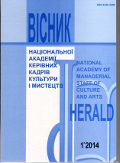RUSSIAN-LITHUANIAN MILITARY CAMPAIGN 1500: THE BATTLE OF THE R.
DOI:
https://doi.org/10.32461/2226-3209.1.2014.137923Keywords:
Grand Duchy of Lithuania, the Russian state, the military campaign, the battle, ancient Russian land, river VedroshAbstract
The realities of today has increased interest in the history of the formation of the state territory and borders. The article touches upon the problems of correlation of voluntariness and violence in the process of formation of the States of Eastern Europe. One such important stages of this process is the struggle between the Great principalities of Moscow and the Lithuanian at the end of the XV – beginning of XVI century the ancient Russian land.
In the scientific literature highlighted some aspects of the problem, there are a number of works on relatives and related topics.
The purpose of the article is to highlight the battle r. Vedrosh and set its consequences.
Base of the research was the complex of archival and published documentary materials. Also used the results of studies of domestic and foreign scientists on questions of Russian-Lithuanian relations.
At the mid-80-ies of the XV century, in fact, was completed the unification of Russian lands under the rule of the Grand Duke of Moscow. The agenda turned out tasks decisive struggle for the accession to the Moscow Kingdom ancient lands, captured during the fourteenth and the beginning of the XV century the Great Lithuanian Principality. From the second half of the 80-ies begins a long military and diplomatic struggle for the old heritage between Russia and Lithuania.
At the end of the 90-ies of the XV century, the relations between Russia and Lithuania again worsened. During the winter 1499 essentially meant a transition to an open confrontation between Ivan III and Alexander І. Act of S. Belsky became the impetus for the movement for accession to the Russian state Chernihiv-Sivers'kyi princes. The diplomatic struggle and military training ended.
Sources on different illuminate as a motive for action princes, and the reasons for the next Russian-Lithuanian war. The Russian Chronicles, to present the official version of the events, and the Polish-Lithuanian report preliminary agreement between Moscow and the princes-traitors.
In the context of the research have the big interest directly to the military events. Therefore, the article details the battle between Moscow and the Lithuanian army r. Vedrosh, the main event of 1500, the attempt to clarify the location, r. Vedrosh, plans and actions of opponents in battle.
The proposed explanation of the course of battle r. Vedrosh is largely hypothetical. This assumption gives the possibility to reconcile the contradictions of different sources.
The number of military forces of both sides is uncertain. As evidenced by the Lithuanian Chronicles, Moscow troops consisted of 40 thousand cavalry, not counting 35 thousand. On other data, the enemythe infantry, and Lithuanian forces were approximately equal. In the structure of the Lithuanian army sources confirm the presence of field artillery.
The main reason for the victory of the Moscow army had the advantage of strategic and tactical management.
An important role was also played by the creation of the reserve regiment and timely its concentration on the direction of the main blow. Moscow shelves on the battlefield well maneuvered and interacted, which provided a fully embodiment of idea of command. On r. Vedrosh in 1500, the outcome of the battle decided to blow ambush regiment. In the course of the battle initiative maneuver held firmly in his hands, Moscow magistrates, and the attack regiment ambush was prepared planned actions of the troops. At a high level was a tactical leadership of Prince D. Shenia, who ably led troops and, using different tactics, surrounded the troops of the enemy. Exemplary maneuvering indicated high discipline and Moscow's troops art of magistrates. In Dorogobuj forests, on the banks of the r. Vedrosh and r. Trosna faced the main forces of the two armies, with each side fought tens of thousands of people. And it was here the first time in the history of the struggle with the Great Lithuanian Principality his troops suffered complete defeat.
Defeat on r. Vedrosh has failed to Grand Duchy of Lithuania resist own forces of the Moscow aggression. Moscow state has managed in a short time capture the enormous territory of ancient Russian and Ukrainian lands belonging Vilno. The success of Moscow in the military 1500, was due not only to military victories, but also the position of princes.
Transition to the side of Ivan III S. Starodubsky and V. Shemiachich gave the opportunity to the Moscow state without a struggle to seize territory Chernihiv-Sivers'kyi lands.
Despite factor conquest, the Moscow authorities didn't was the occupier for the local population, deliberately avoided the ruin of the annexed territories and protected them, in particular, from the Great Horde of the Tatars.
Downloads
Published
Issue
Section
License
Authors who publish with this journal agree to the following terms:
1. Authors retain copyright and grant the journal right of first publication with the work simultaneously licensed under a Creative Commons Attribution License International CC-BY that allows others to share the work with an acknowledgement of the work's authorship and initial publication in this journal.
2. Authors are able to enter into separate, additional contractual arrangements for the non-exclusive distribution of the journal's published version of the work (e.g., post it to an institutional repository or publish it in a book), with an acknowledgement of its initial publication in this journal.
3. Authors are permitted and encouraged to post their work online (e.g., in institutional repositories or on their website) prior to and during the submission process, as it can lead to productive exchanges, as well as earlier and greater citation of published work (See The Effect of Open Access).


